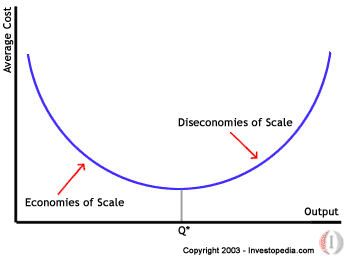E. F. Schumacher - Wikipedia, the free encyclopedia
- who gave his name to the Schumacher College at Dartington, Totnes:
Environmental education, Sustainable education and Sustainable futures - Schumacher College
In other words, big is not necessarily beautiful - and costs of growing outweigh the benefits.
This is called the 'diseconomies of scale':

Diseconomies Of Scale Definition | Investopedia
Diseconomies of scale - Wikipedia, the free encyclopedia
BBC - GCSE Bitesize: Diseconomies of scale
Locality, "the nationwide network for community-led organisations"
Locality home page « Locality
has come up with a report challenging the way in which local services are provided:

 Diseconomies of scale « Locality
Diseconomies of scale « Locality
.
.
.
Locality, "the nationwide network for community-led organisations"
Locality home page « Locality
has come up with a report challenging the way in which local services are provided:
Diseconomies of scale

Locality, in partnership with Professor John Seddon of Vanguard, has published its ground-breaking research project challenging the assumption that ‘economies of scale’ are achieved in the running of public services.
The report “Saving money by doing the right thing: why ‘local by default’ must replace ‘diseconomies of scale’” reveals the potential to save in the region of £16 billion by improving services in communities.
It represents a staggering opportunity for the UK to re-organise public sector resources.
Our four key recommendations
• Local by default. Commissioning and delivering public services should take place at the neighbourhood level, as the default position, and any move to levels beyond the neighbourhood would need to be justified as exceptional.
• Help people to help themselves. People are the solutions not just the problems. This is a massive resource but all too often overlooked.
• Focus on purpose not outcomes. Predetermined output targets and even predetermined outcome targets start from the wrong place. A focus on underlying purpose is what will make the difference, especially if aligned as closely as possible to individual aspiration.
• Manage value not cost. When commissioners and managers try to drive down unit costs they end up with dysfunctional delivery that does not address the real problems, but pushes them elsewhere and ends up costing the public purse even more. The only way to drive down costs is by focusing on value. In other words, designing services that address problems early and always add value.

‘Economies of scale’ are failing us
The report challenges the widely accepted notion of ‘the economy of scale’ demonstrating how it leads to increased costs and escalating demand for services. It probes the heart of the debate about the future of public sector reform and contracting and points the way to alternative models of effective public service commissioning and delivery.
“The drive towards standardisation and larger and larger contracts has generated billions of pounds worth of unnecessary demand on public services, and has fed the monster of corporate greed. We must stop feeding this monster. And the way to do that is to abandon the false economy of scale ideology in favour of what we know delivers best, for people and for the pound in the public pocket: going local, putting the community in the driving seat, focusing on added value and tackling problems early on.” Steve Wyler, CEO Locality
Read the news story.
Read the diseconomies case studies, showing the human cost of failing public services: Jake, Ruth and Melvyn.
Read Neil Berry’s blog explaining the aims of the project and why he believes changes are urgently needed to commissioning and procurement.
.
.
.
